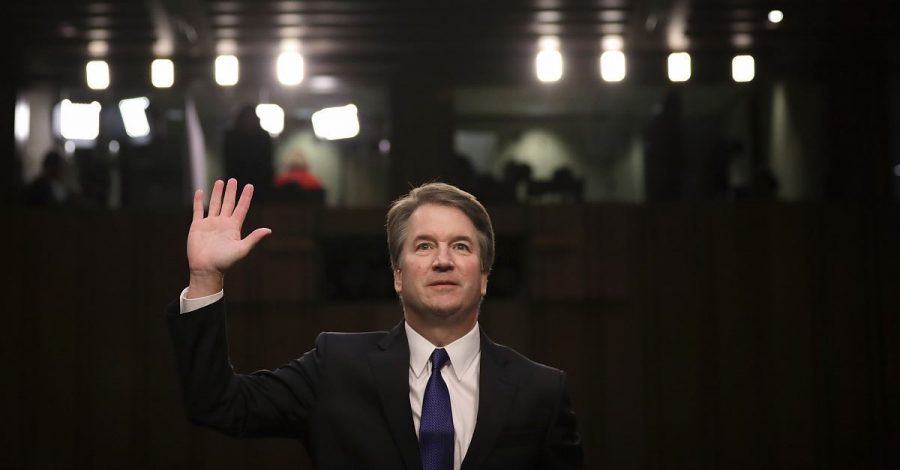Your donation will support the student journalists of Coral Gables Senior High School. Your contribution will help us cover our annual website hosting costs.
A New Low for the Nation’s Highest Court
With the confirmation of Brett M. Kavanaugh, the lowest blows in politics surrounded the nation’s highest court. The Supreme Court’s new associate justice was the subject of the most bitter and partisan political battle that the country has seen since the election of president Donald Trump.
Oct 15, 2018
When Justice Kavanaugh was confirmed to the nation’s highest court this Saturday, Oct. 6, the nation jumped through the window that Donald Trump’s election opened in 2016. The next age of the U.S. political process has indeed taken hold, and the implications are relevant not only to judges and congresspeople, but high school students — especially high school students. Yes, the ideological balance of the nation’s highest court is now tipped conservative, but regardless of your political ideology, there are lessons to be learned from the series of shouting matches that was the confirmation process of Brett M. Kavanaugh.
First among the morals of this story is that people in government are willing to politicize anything if it means scoring more points with voters. Broadway better be nervous, because a new generation of political theatrics has just taken the stage, and the American people seem to be more willing than ever to watch the puppet show. This is not a partisan argument. Everybody involved in the hearings — Democrat, Republican — shares a part of the blame.
In this year’s first issue of highlights, we published an opinion piece titled “Civility: The missing piece.” Our writer argued that the clearly visible divide in politics is only getting wider, and a lack of civility and common decency is fueling this rise in anger from both sides. Little did our writer or the rest of the staff know how pertinent the article would become to Kavanaugh’s confirmation hearings less than a month later. Nobody has to prove that there is an increasingly vicious divide and a lack of civil discourse in our society; it is already clear to people from both sides of the aisle that everyone seems to be angry. The bitterness surrounding the fight to confirm Kavanaugh is not an isolated event. Kavanaugh’s confirmation fight is a product of the resentful attitude both parties have towards each other, and angrier political controversies are set to appear in greater numbers if the bickering does not give way to polite debate and civil discourse that aims simply to better the country instead of smearing the other side.
The Supreme Court was always intended to be an institution isolated from the passions of the fickle, frequently inflamed public. So much for that. Throughout the 89 days between Kavanaugh’s nomination and his confirmation, Senate Republicans like Lindsey Graham gave impassioned speeches accusing Democrats of playing political theater, while progressive members of the senate judiciary committee like Cory Booker made a show out of their fiery public interrogations of the nominee. The display of emotion and partisanship was ridiculously out of place during a process meant to be routine and easy. Neither of the last two successful confirmation processes for nominees were politicized in this way — not Trump’s nomination of Neil Gorsuch nor Obama-appointee Elena Kagan. That a judge who could draw such controversy was nominated in the first place is likely part of the dilemma, but the growing nationwide propensity to retreat to the poles of the political spectrum was likely the main fuel behind this wildfire of an inappropriate political fight.
As mentioned before, this nomination has particular significance for high school students, for a variety of reasons: firstly, in multiple allegations of sexual assault, Kavanaugh is accused of committing misconduct during high school. Plenty of opinions exist with regards to the veracity of these claims against him, but regardless of whether Brett Kavanaugh did what he is accused of, it is clear that the choice to not uphold the highest standard of moral character during one’s high school years can lead to nearly jeopardized job prospects.
The other reason that adolescents should be paying attention now, however, is just as urgent and pertinent. The frequently referenced “you children are the future” trope may get old quickly, but every adult references it for a reason: as older generations take their leave and Millennials and Generation Z come to the forefront, the responsibility begins to rest more and more on the shoulders of those still in high school to take a stand and cease the relentless animosity that has plagued public discourse. Our generation is presented with a twofold path: pick a side and vehemently, relentlessly defend it, or approach disagreements in a manner conducive to civility and common understanding. Only one of these paths leads to the end of political bickering exemplified by public fights like the one over Kavanaugh. The young people of America will have to decide on the best way to approach the political disagreements of our time — we should at least beware of the consequences of each choice.
The confirmation hearings of Brett M. Kavanaugh are complete. The 163rd person to be nominated for the Supreme Court, and the 114th person to sit on the bench, Trump’s nominee has been successfully appointed to the bench for life, and squabbling over his confirmation is now an exercise in futility. But what isn’t futile is calling on the American government to end dangerous political theater and once again embrace transparency. The ultimate responsibility, however, lies with the American people, especially young Americans, to ensure that political battles that threaten democracy can never catch flame again.
